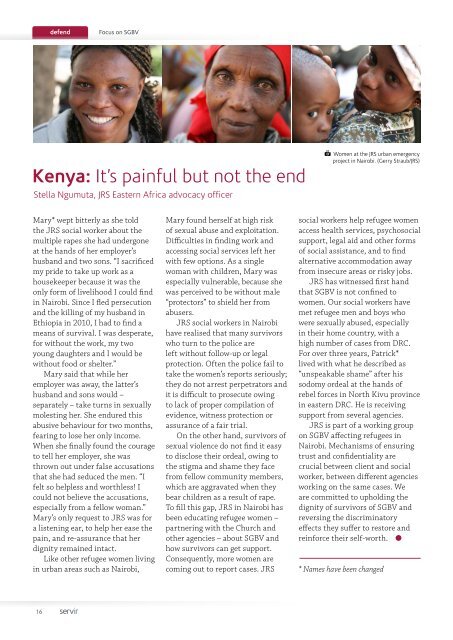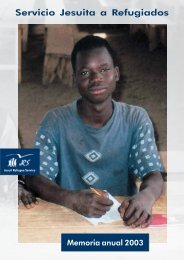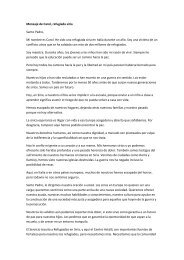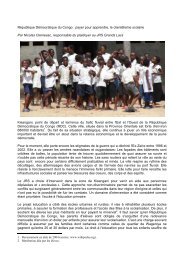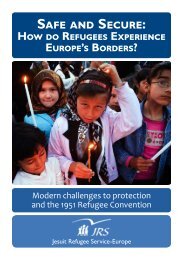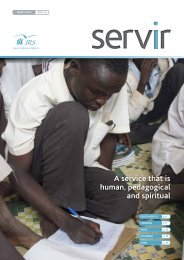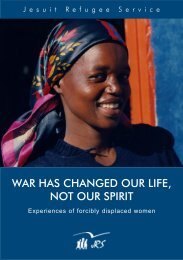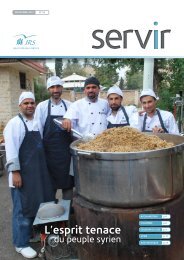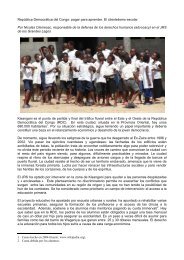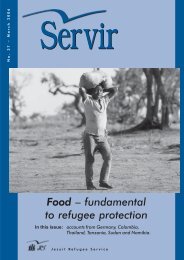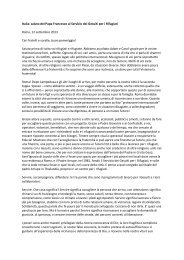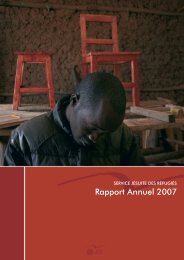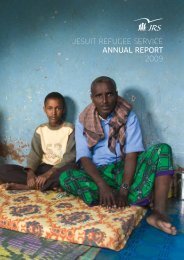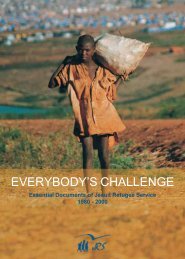You also want an ePaper? Increase the reach of your titles
YUMPU automatically turns print PDFs into web optimized ePapers that Google loves.
defend<br />
Focus on SGBV<br />
Kenya: It’s painful but not the end<br />
Stella Ngumuta, JRS Eastern Africa advocacy officer<br />
Women at the JRS urban emergency<br />
project in Nairobi. (Gerry Straub/JRS)<br />
Mary* wept bitterly as she told<br />
the JRS social worker about the<br />
multiple rapes she had undergone<br />
at the hands of her employer’s<br />
husband and two sons. “I sacrificed<br />
my pride to take up work as a<br />
housekeeper because it was the<br />
only form of livelihood I could find<br />
in Nairobi. Since I fled persecution<br />
and the killing of my husband in<br />
Ethiopia in 2010, I had to find a<br />
means of survival. I was desperate,<br />
for without the work, my two<br />
young daughters and I would be<br />
without food or shelter.”<br />
Mary said that while her<br />
employer was away, the latter’s<br />
husband and sons would –<br />
separately – take turns in sexually<br />
molesting her. She endured this<br />
abusive behaviour for two months,<br />
fearing to lose her only income.<br />
When she finally found the courage<br />
to tell her employer, she was<br />
thrown out under false accusations<br />
that she had seduced the men. “I<br />
felt so helpless and worthless! I<br />
could not believe the accusations,<br />
especially from a fellow woman.”<br />
Mary’s only request to JRS was for<br />
a listening ear, to help her ease the<br />
pain, and re-assurance that her<br />
dignity remained intact.<br />
Like other refugee women living<br />
in urban areas such as Nairobi,<br />
Mary found herself at high risk<br />
of sexual abuse and exploitation.<br />
Difficulties in finding work and<br />
accessing social services left her<br />
with few options. As a single<br />
woman with children, Mary was<br />
especially vulnerable, because she<br />
was perceived to be without male<br />
“protectors” to shield her from<br />
abusers.<br />
JRS social workers in Nairobi<br />
have realised that many survivors<br />
who turn to the police are<br />
left without follow-up or legal<br />
protection. Often the police fail to<br />
take the women’s reports seriously;<br />
they do not arrest perpetrators and<br />
it is difficult to prosecute owing<br />
to lack of proper compilation of<br />
evidence, witness protection or<br />
assurance of a fair trial.<br />
On the other hand, survivors of<br />
sexual violence do not find it easy<br />
to disclose their ordeal, owing to<br />
the stigma and shame they face<br />
from fellow community members,<br />
which are aggravated when they<br />
bear children as a result of rape.<br />
To fill this gap, JRS in Nairobi has<br />
been educating refugee women –<br />
partnering with the Church and<br />
other agencies – about SGBV and<br />
how survivors can get support.<br />
Consequently, more women are<br />
coming out to report cases. JRS<br />
social workers help refugee women<br />
access health services, psychosocial<br />
support, legal aid and other forms<br />
of social assistance, and to find<br />
alternative accommodation away<br />
from insecure areas or risky jobs.<br />
JRS has witnessed first hand<br />
that SGBV is not confined to<br />
women. Our social workers have<br />
met refugee men and boys who<br />
were sexually abused, especially<br />
in their home country, with a<br />
high number of cases from DRC.<br />
For over three years, Patrick*<br />
lived with what he described as<br />
“unspeakable shame” after his<br />
sodomy ordeal at the hands of<br />
rebel forces in North Kivu province<br />
in eastern DRC. He is receiving<br />
support from several agencies.<br />
JRS is part of a working group<br />
on SGBV affecting refugees in<br />
Nairobi. Mechanisms of ensuring<br />
trust and confidentiality are<br />
crucial between client and social<br />
worker, between different agencies<br />
working on the same cases. We<br />
are committed to upholding the<br />
dignity of survivors of SGBV and<br />
reversing the discriminatory<br />
effects they suffer to restore and<br />
reinforce their self-worth.<br />
* Names have been changed<br />
16


